Why Is Condensation On Air Ducts A Cause For Concern?
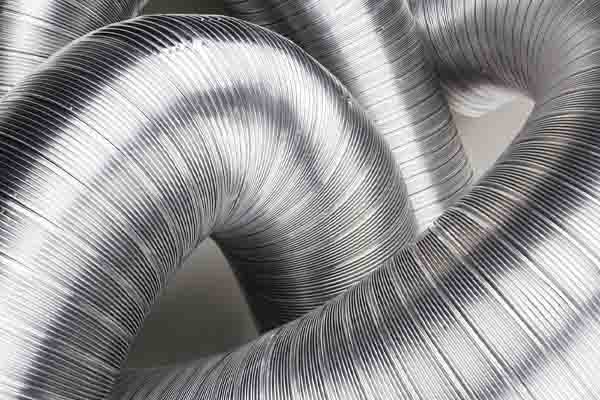
HVAC air duct condensation is a cause for concern due to its potential risks to your HVAC system and indoor air quality. When moisture accumulates on the vents, it creates a perfect environment conducive to mold and mildew growth. This can lead to health issues and compromised air circulation. Condensation can cause damage to the ductwork, which can lead to structural problems and decreased system efficiency. Understanding the causes and consequences of condensation on air ducts is essential for addressing the issue promptly. It ensures a healthy and well-functioning HVAC system.
Why Is Condensation On Air Ducts A Cause For Concern?
Contents
While condensation on air ducts may raise concerns, it is not necessarily signal the end of your HVAC system’s life. There are ways to mitigate the impact and protect your heating and cooling system. Read on to find out more.
Related Article: Rust On Air Conditioner Condenser: What You Should Know
What Is Condensation?
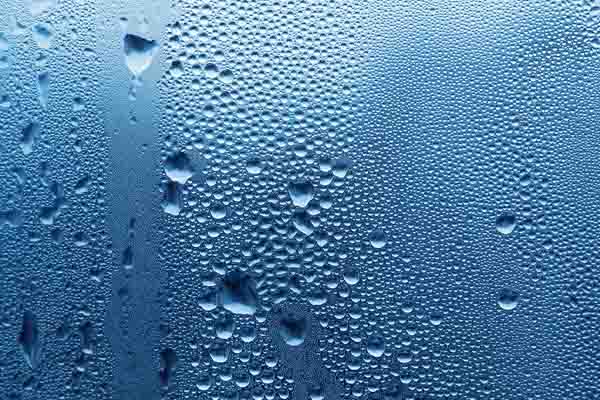
Condensation is the process of water vapor changing into liquid water when it comes into contact with a cooler surface. A familiar example of condensation is when you pour a cold drink into a glass on a hot day. As the cold liquid comes into contact with the outside of the glass, water droplets start to form on the surface. This is because the glass is colder than the surrounding air. This causes the water vapor in the air to lose heat and transform into liquid droplets. This phenomenon occurs due to the temperature difference between the air and the cold glass, leading to the conversion of water vapor into liquid form.
Condensation can also occur on HVAC air ducts due to the same process. For example, when using your air conditioning system, the cold air passes through the ductwork, causing the ducts to become cold. When the warmer surrounding air comes into contact with these cooler ducts, it results in excessive sweating or condensation on the ductwork.
However, while this is a common cause of ductwork sweating, it is not the only factor to consider. There are several other reasons why your ductwork may experience condensation. We will discuss that later on in this guide.
Related Article: Understanding the Hazards of Using an Old Air Conditioner
How Condensation Affects HVAC Ductwork
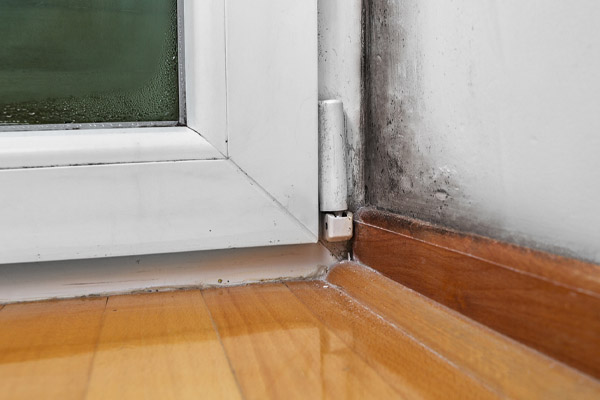
Condensation can have adverse effects on HVAC ductwork. When moisture accumulates on the ducts, it can lead to several issues:
- Mold and Mildew Growth: Excess moisture creates a favorable environment for mold and mildew growth. These microorganisms can spread through the ductwork and the house, compromising indoor air quality and potentially causing health problems.
- Structural Damage: Over time, condensation can damage the ductwork. The moisture can lead to corrosion, rusting, and deterioration of the ducts, weakening their structural integrity. This can result in air leaks, reduced airflow, and increased energy consumption.
- Reduced Efficiency: Condensation on the ducts can disrupt proper airflow. The accumulation of moisture can create obstructions or blockages. It can hinder the efficient distribution of conditioned air throughout the space. This can lead to uneven heating and cooling, reduced comfort, and increased energy usage.
- Increased Energy Costs: When the ductwork is compromised by condensation, the heating and air conditioning system may need to work extra hard to compensate for the reduced airflow. This can result in higher energy consumption and increased utility bills.
Related Article: When to Call Emergency HVAC Services
Causes of Condensation in Air Ducts

Condensation in air ducts can occur due to several reasons. Here are some common causes of condensation in your air ducts:
- Temperature Difference: The most common cause of condensation in air ducts is the temperature difference between the air inside the ducts and the air surrounding them. When the air comes into contact with the duct surface, moisture in the air condenses and forms water droplets.
- High Humidity: If the humidity levels in your home or the surrounding are elevated, it can contribute to condensation on air ducts. When the air is saturated with moisture, it is likely to release excess moisture when it comes in contact with a cooler surface.
- Poor Insulation: Inadequate insulation on air ducts can cause temperature variations between the ducts and the surrounding air. This temperature difference can promote condensation on the duct surface.
- Air Leakage: Air leakage in the ductwork can introduce warm, humid air from attics, crawl spaces, or basements into cooler ducts. The mixing of air temperatures can lead to condensation.
- Inadequate Ventilation: Insufficient ventilation in the duct system can impede proper airflow and cause stagnant air to accumulate. Stagnant air increases the likelihood of condensation.
- Improper Duct Installation: Poorly designed or incorrectly installed ductwork can result in air leaks, temperature imbalances, and condensation issues.
Identifying and addressing the underlying causes of condensation in air ducts is essential to prevent moisture-related problems. Consulting with a professional HVAC technician can help diagnose and resolve the specific causes of condensation in your air ducts.
How To Stop Condensation On HVAC Ductwork
To prevent condensation on air ducts, here are some practical measures you can take:
Related Article: 10 Winter Hacks For A Warmer House Without Cranking Up The Thermostat
Insulate The Ductwork
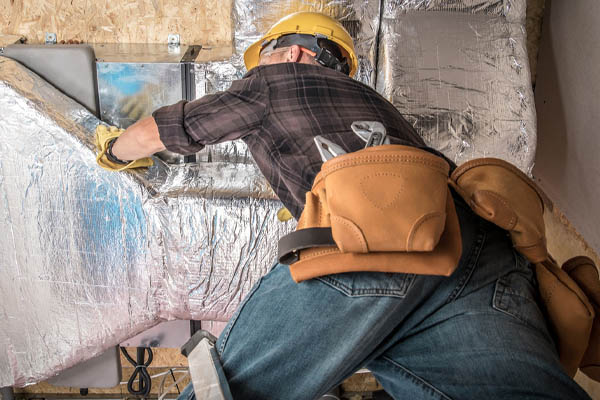
Properly insulated air ducts use insulation materials with a high R-value. Insulation helps maintain the temperature of the duct surface, minimizing the potential for condensation. Make sure your insulation is of high quality.
Seal Duct Leaks
Air leaks in the ductwork can introduce warm, humid air, leading to condensation. Call an HVAC contractor to seal any leaks or gaps. They will use their knowledge to ensure your home has airtight ducts.
Related Article: What Is Mechanical Ventilation & How Does It Impact Your Home Comfort?
Maintain Proper Ventilation
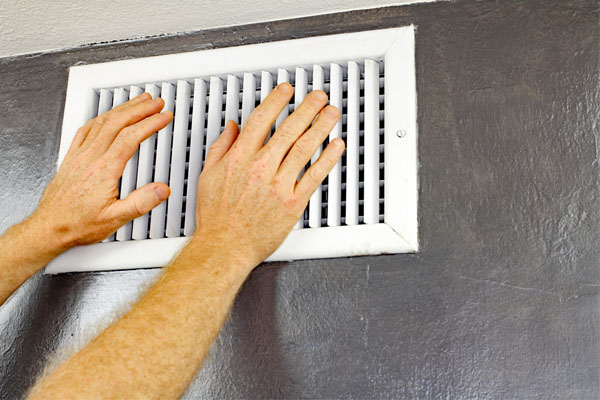
Make sure there is adequate ventilation in the duct system to promote proper airflow. This helps prevent stagnant air and reduces the chances of condensation. Properly sized supply and return vents can aid in maintaining good air circulation.
Control Indoor Humidity
Use dehumidifiers or ventilation systems to control and reduce indoor humidity levels. Keeping humidity within recommended ranges (typically between 30% ad 50%) helps minimize the potential for condensation.
Proper HVAC Sizing
Make sure that your HVAC system is appropriately sized for your home HVAC needs. Oversized or undersized systems can contribute to condensation issues. Consult an HVAC professional to determine the right size for your specific requirements.
Related Article: The Difference Between A Portable & Whole Home Air Filtration System
Regular HVAC Maintenance
Schedule regular HVAC maintenance to identify and address any potential condensation problems early on. This allows for timely repairs or adjustments to prevent further issues.
By implementing these preventive measures, you can minimize or eliminate condensation on air ducts. These help maintain a well-functioning HVAC system and preserve good indoor air quality. Consulting an HVAC expert can provide additional guidance tailored to your specific situation.
Related Article: Top Reasons Your Air Conditioner Is Not Removing Humidity
Conclusion
Preventing condensation on air ducts is achievable by addressing the underlying causes. You can combat these issues by maintaining the ductwork, investing in a dehumidifier/humidifier, and adding insulation to the HVAC ducts. With a better understanding of the causes and appropriate preventive actions, you can successfully stop condensation on your air ducts and enjoy efficient and reliable cooling throughout your space.
Call McAllister Energy For All Of Your HVAC Requirements

McAllister Energy is the foremost provider of heating and cooling services throughout southern New Jersey. Our team comprises highly trained and certified technicians specializing in HVAC tune-ups, repairs, installations, replacements, and more. We are highly committed to providing top-notch services to all our clients.
We understand the significance of a comfortable and energy-efficient home, so we offer competitively priced services. Our maintenance services are tailored to enhance comfort and reduce energy bills. If you require an HVAC repair or replacement, our knowledgeable technicians can recommend the best solution while considering your budget. We take pride in our HVAC work and offer a satisfaction guarantee so you get the best service possible.
To schedule a service appointment with us, simply contact us via phone. We offer quick free, in-home estimates to help you make informed decisions about your HVAC systems. You can rely on McAllister Energy to provide exceptional heating and cooling services that surpass your expectations! Call us now!
You can click here to contact us now or call us at (856) 665-4545 to find out more! Click the link to view our service area.